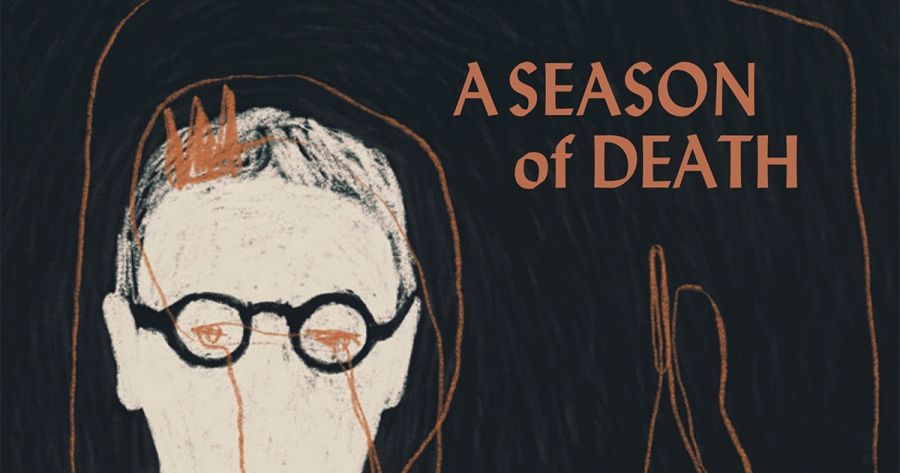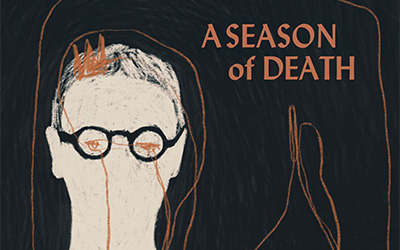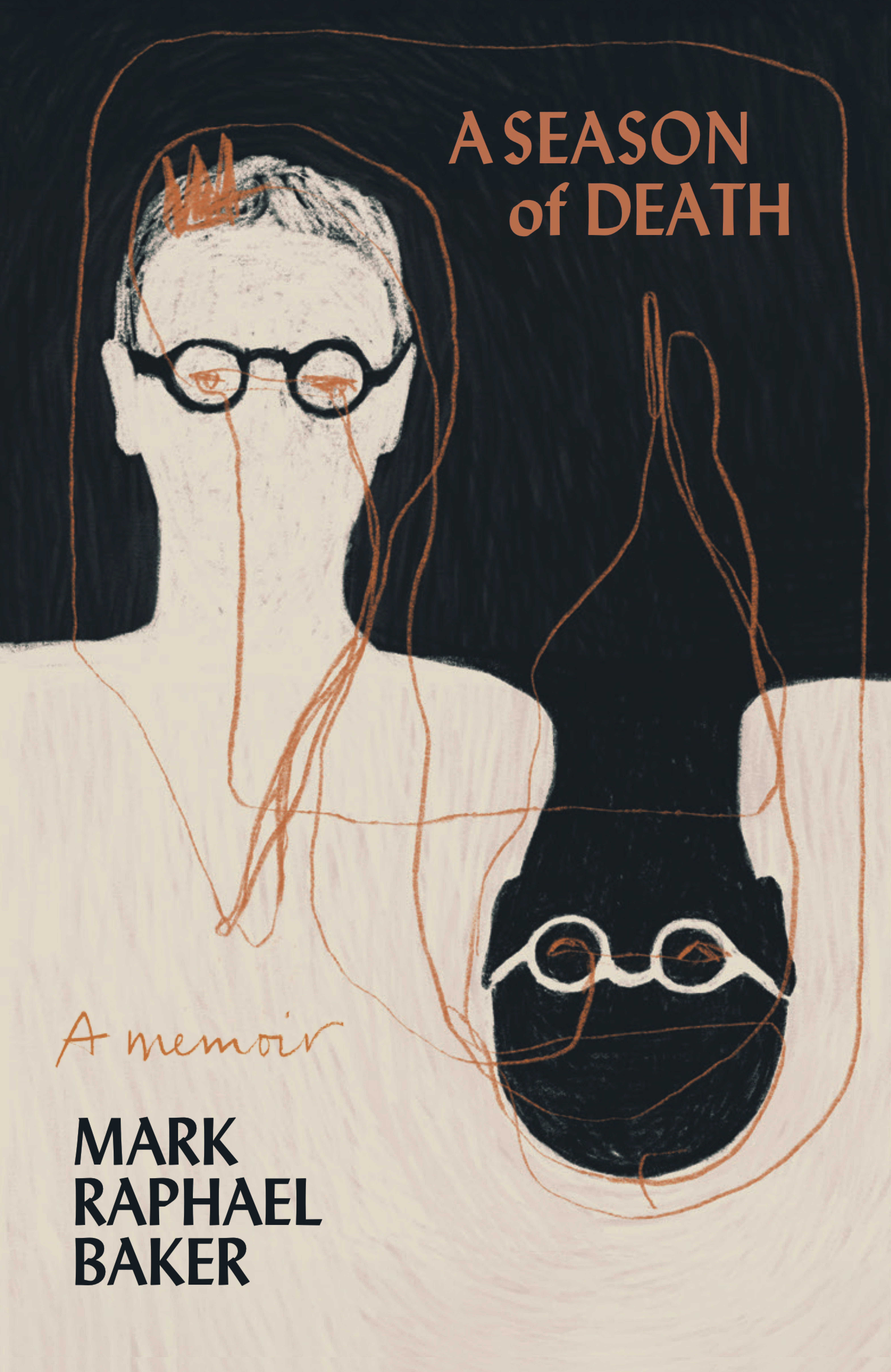
- Free Article: No
- Contents Category: Memoir
- Review Article: Yes
- Article Title: For every season
- Article Subtitle: A mosaic-like meditation on mortality
- Online Only: No
- Custom Highlight Text:
Mark Raphael Baker started writing this memoir on his first night in hospital after being diagnosed with pancreatic cancer in 2022. His wife, Kerryn, had died of a rare gastric cancer seven years before. His brother, Johnny, died of oesophageal cancer just two years after Kerryn. He is also reckoning with the death of his elderly father. The emotional intensity of these losses is the foundation of A Season of Death. ‘Three graves in five years,’ Baker writes. ‘While no number of deaths could make me indifferent to what awaits me, watching a sequence of deaths in the family has made me more prepared. I feel as though I have been trained or mentored in the art of dying.’
- Featured Image (400px * 250px):

- Alt Tag (Featured Image): Kate McFadyen reviews ‘A Season of Death: A memoir’ by Mark Raphael Baker
- Book 1 Title: A Season of Death
- Book 1 Subtitle: A memoir
- Book 1 Biblio: Melbourne University Press, $29.99 pb, 257 pp
- Book 1 Cover Small (400 x 600):

- Book 1 Cover (800 x 1200):

- Book 1 Readings Link: https://www.readings.com.au/product/9780522880892/a-season-of-death--mark-raphael-baker--2024--9780522880892#rac:jokjjzr6ly9m
This ‘training’ allows Baker to write about death in all its facets, not just the existential. There is a lot of consideration of time and synchronicity in this book. One of its epigraphs is the well-known passage from Ecclesiastes about there being a time for every season. How much time do you think you have left? How much is enough time to live a fulfilled life? How do you spend your time when you know you don’t have long to live?
Throughout the book, Baker takes comfort from Yiddish and Hebrew words and maxims, often as a way of diffusing sadness, allowing him to be playful and sincere at the same time. This linguistic dimension conveys him back to the time of his childhood, to his parents and their Yiddish-speaking friends, who used language to span centuries of cultural connections brutally severed during World War II. It is a reminder that there will always be people who love you, who will carry the memory of you. Ceremonies mark the passage of the year: religious holidays, births, engagements, deaths, at once acknowledging those who are absent while celebrating those present. Although many aspects of Baker’s personal life are made explicit in this book, there is a poignancy to his leaving unsaid the certainty of his absence at the next important family gathering.
As much as it is a mediation on the finality of death, A Season of Death is just as much about the varied ways grief can be transmuted into a new perspective on life. Baker writes of finding new love with his second wife, Michelle Lesh, and how this relationship and the birth of their daughter, Melila (to whom the book is dedicated), rejuvenated him.
In Baker’s previous book, Thirty Days (2017), he wrote about Kerryn’s illness and the profound sadness of caring for his beloved wife as she died. As the carer now being cared for, Baker is aware of how much the extremities of both experiences reveal about a person. In reflecting upon the powerful feelings he had while caring for Kerryn, the inward turn that isolated him in his grief, he is communicating to Michelle his understanding of the difficulty of her role in looking after him and their infant daughter. He knows how harrowing it is to watch someone you love die: ‘What haunts me most about dying is the deep knowledge I’ve gained about the suffering of those who will “survive” me.’
The latter sections of A Season of Death are the most galvanising in their visceral directness. Baker describes the agonisingly long road to the diagnosis of his pancreatic cancer, and his subsequent treatments. He spares no detail of the abject helplessness he felt when in pain, describing the psychological twists and turns of being misdiagnosed again and again, his symptoms being dismissed as constipation or indigestion when he knew something was not right. He observes various specialists noting his recent bereavements and tacitly presuming that his symptoms are psychosomatic.
Baker tells the story of Reb Zusia, an esteemed rabbi who, as he lay weeping on his deathbed, identified the source of his fear: ‘When I face God, I will be asked, Reb Zusia, why weren’t you Reb Zusia?’ In reflecting on his life as the end is in sight, Baker fantasises about a parallel life, in which his ‘one last vainglorious tilt at living would be an act of megaphone martyrdom’. He is proud of his personal politics, of his conviction in standing up for what he thinks is right, often in the face of stern community opposition. ‘I still consider the occupation regime in Israel-Palestine to be deeply unjust,’ he writes, ‘and that as a Jew, and an identifying Zionist, I am implicated in the tragedy of the settlement enterprise and the oppression of Palestinians.’
In examining this aspect of himself, Baker comes to realise that, with the diminishing hope that accompanies a terminal diagnosis, it is an integral but only small part of what makes him Mark Raphael Baker. The part of himself he wishes to reckon with and stand beside when he dies is far humbler, not defined by scholarly achievements and political gestures, but ‘narrowed into a series of concentric circles at whose core lies my family; followed by close friends’.
A Season of Death is an incomplete book, a draft made in the saddest of circumstances. This is a book that should be read after the postscript, which reveals the arduous process of the book’s composition and how it was edited. Baker wrote every day, often when he was in pain or exhausted from treatments. This drive explains the book’s at times uneven tone and mosaic-like quality. If Baker had been well enough, if he had more time to redraft and refine his thoughts and ideas, A Season of Death would have been extraordinary. As it stands, the reader can glean how much he loved his family and how much he wished to be understood by them, all the aspects of himself.


Comments powered by CComment